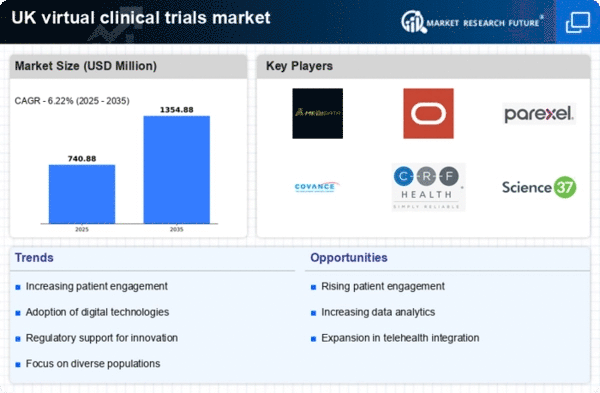Regulatory Evolution and Support
The virtual clinical-trials market is witnessing a shift in regulatory frameworks that increasingly support remote trial methodologies. In the UK, regulatory bodies are adapting guidelines to accommodate the unique aspects of virtual trials, which may enhance compliance and streamline approval processes. This evolution suggests a growing recognition of the validity of virtual methodologies, potentially leading to a more favorable environment for trial sponsors. As regulations become more aligned with technological advancements, the virtual clinical-trials market is likely to benefit from increased trust and acceptance among stakeholders. This regulatory support is crucial for fostering innovation and encouraging the adoption of virtual trials.
Focus on Real-World Evidence Generation
The virtual clinical-trials market is increasingly focused on generating real-world evidence, which is becoming essential for regulatory submissions and market access. In the UK, the integration of real-world data into clinical trials is gaining traction, as it provides insights into treatment effectiveness in diverse populations. This approach not only enhances the relevance of trial outcomes but also supports the development of more personalized therapies. The emphasis on real-world evidence indicates a shift towards more pragmatic trial designs, which are likely to resonate with both regulators and healthcare providers. As the demand for real-world data continues to rise, the virtual clinical-trials market is expected to evolve in response to these changing needs.
Cost Efficiency and Resource Optimization
The virtual clinical-trials market is recognized for its potential to reduce costs associated with traditional trial methods. By eliminating the need for physical sites and extensive travel, virtual trials can lower operational expenses by up to 40%. In the UK, pharmaceutical companies are beginning to realize the financial benefits of adopting virtual methodologies, which allow for better allocation of resources. This cost efficiency not only makes trials more feasible but also encourages more organizations to invest in virtual clinical trials. As the industry continues to seek ways to optimize budgets while maintaining quality, the financial advantages of virtual trials are likely to drive further adoption.
Increased Patient Engagement and Recruitment
The virtual clinical-trials market is benefiting from enhanced patient engagement strategies that leverage digital platforms. In the UK, the use of mobile applications and online portals has improved patient recruitment rates by approximately 25%. These tools allow for easier access to trial information and enable patients to participate from the comfort of their homes. This shift not only broadens the participant pool but also fosters a more inclusive approach to clinical research. As patients become more involved in their healthcare decisions, the virtual clinical-trials market is likely to see continued growth driven by this increased engagement. The ability to reach diverse populations through digital means is a key factor in the evolving landscape of clinical trials.
Technological Advancements in Data Management
The virtual clinical-trials market is surging due to rapid advancements in data management technologies. Innovations such as artificial intelligence and machine learning are streamlining data collection and analysis, enhancing the efficiency of trials. In the UK, the integration of these technologies has led to a 30% reduction in data processing times, allowing for quicker decision-making. Furthermore, the ability to manage large datasets remotely is crucial for virtual trials, as it facilitates real-time monitoring and analysis. This trend indicates a shift towards more sophisticated data handling capabilities, which are essential for the success of virtual clinical trials. As the industry evolves, the demand for advanced data management solutions is likely to grow, further propelling the virtual clinical-trials market.
















